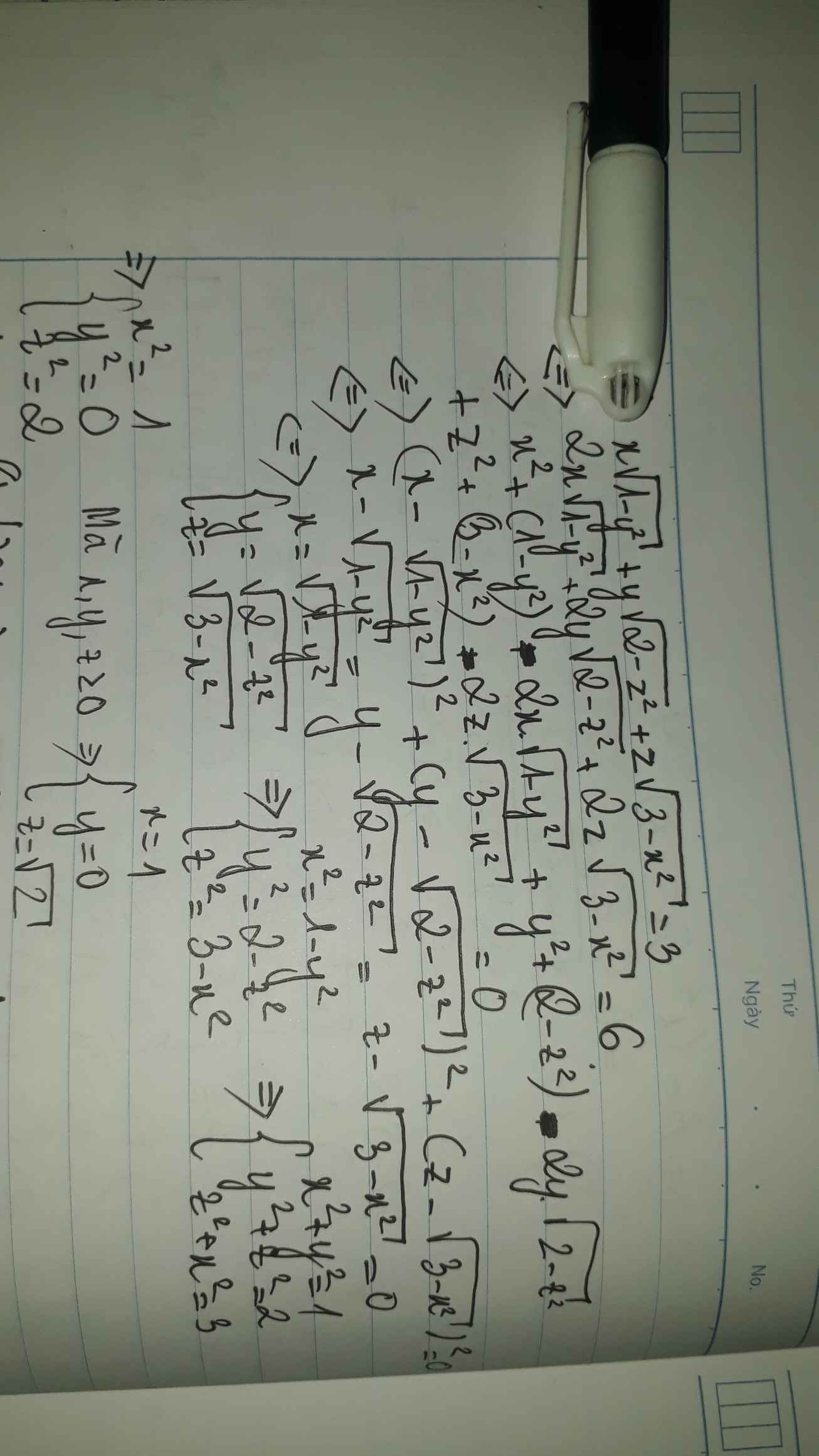tìm các số nguyên x,y,z thoả mãn x2+y2+z2<xy+3y+2z-4
LD
Những câu hỏi liên quan
Tìm các số nguyên x, y, z đồng thời thoả mãn các điều kiện sau :
x2 = y - 1 ; y2 = z -1 ; z2 = x - 1
Tìm các số thực dương x,y,z thoả mãn:
x. căn của (1-y2) + y. căn của (2-z2) + z. căn của (3-x2) = 3
cho các số thực x, y ,z không âm thoả mãn : x2+y2+z2=1 .
Tìm giá tri nhỏ nhất và giá tri lớn nhất của \(A=\sqrt{x+y}+\sqrt{y+z}+\sqrt{z+x}\)
\(A\le\sqrt{3\left(x+y+y+z+z+x\right)}=\sqrt{6\left(x+y+z\right)}\le\sqrt{6.\sqrt{3\left(x^2+y^2+z^2\right)}}=\sqrt{6\sqrt{3}}\)
\(A_{max}=\sqrt{6\sqrt{3}}\) khi \(x=y=z=\dfrac{1}{\sqrt{3}}\)
Do \(x^2+y^2+z^2=1\Rightarrow0\le x;y;z\le1\)
\(\Rightarrow\left\{{}\begin{matrix}x^2\le x\\y^2\le y\\z^2\le z\end{matrix}\right.\) \(\Rightarrow x+y+z\ge x^2+y^2+z^2=1\)
\(A^2=2\left(x+y+z\right)+2\sqrt{\left(x+y\right)\left(x+z\right)}+2\sqrt{\left(x+y\right)\left(y+z\right)}+2\sqrt{\left(y+z\right)\left(z+x\right)}\)
\(A^2=2\left(x+y+z\right)+2\sqrt{x^2+xy+yz+zx}+2\sqrt{y^2+xy+yz+zx}+2\sqrt{z^2+xy+yz+zx}\)
\(A^2\ge2\left(x+y+z\right)+2\sqrt{x^2}+2\sqrt{y^2}+2\sqrt{z^2}=4\left(x+y+z\right)\ge4\)
\(\Rightarrow A\ge2\)
\(A_{min}=2\) khi \(\left(x;y;z\right)=\left(0;0;1\right)\) và các hoán vị
Đúng 0
Bình luận (0)
cho các số thực x, y ,z không âm thoả mãn : x2+y2+z2=1 . tìm giá tri nhỏ nhất và giá tri lớn nhất của P = √ (x^2 + y^2) + √(y^2 + z^2) + √ (z^2 + x^2)
Cho x,y,z là các số thực dương thoả mãn x2-y2+z2=xy+3yz+zx
Tìm Max P=\(\dfrac{x}{(2y+z)^{2}}+\dfrac{1}{xy(y+2z)}\)
Cho x, y, z là các số thực thoả mãn điều kiện \(\dfrac{3x^2}{2}\)+ y2 + z2 +yz = 1. Tìm GTNN và GTLN của biểu thức A = x + y + z
\(\Leftrightarrow3x^2+2y^2+2z^2+2yz=2\)
\(\Rightarrow2\ge3x^2+2y^2+2z^2+y^2+z^2\)
\(\Leftrightarrow2\ge3\left(x^2+y^2+z^2\right)\)
Có: \(\left(x+y+z\right)^2\le3\left(x^2+y^2+z^2\right)\le2\)
\(\Rightarrow\)\(A^2\le2\) \(\Leftrightarrow A\in\left[-\sqrt{2};\sqrt{2}\right]\)
minA=-1\(\Leftrightarrow\)\(\left\{{}\begin{matrix}x+y+z=-\sqrt{2}\\x=y=z\end{matrix}\right.\) \(\Rightarrow x=y=z=-\dfrac{\sqrt{2}}{3}\)
maxA=1\(\Leftrightarrow\left\{{}\begin{matrix}x+y+z=\sqrt{2}\\x=y=z\end{matrix}\right.\) \(\Rightarrow x=y=z=\dfrac{\sqrt{2}}{3}\)
Đúng 4
Bình luận (1)
Cho các số x,y,z dương thỏa mãn:
x2 +y2 +z2 = 1. Tìm GTNN của M= 1/16x2 +1/4y2 + 1/z2
\(M=\dfrac{\dfrac{1}{16}}{x^2}+\dfrac{\dfrac{1}{4}}{y^2}+\dfrac{1}{z^2}\ge\dfrac{\left(\dfrac{1}{4}+\dfrac{1}{2}+1\right)^2}{x^2+y^2+z^2}=\dfrac{49}{16}\)
\(M_{min}=\dfrac{49}{16}\) khi \(\left(x;y;z\right)=\left(\dfrac{1}{\sqrt{7}};\dfrac{2}{\sqrt{14}};\dfrac{2}{\sqrt{7}}\right)\)
Đúng 1
Bình luận (1)
Tìm các bộ số tự nhiên ( x , y ,z ) thỏa mãn x \(\le\) y \(\le\) z; x2+y2+z2=34. ( Ai giúp mình với )
Dùng phương pháp chặn :
x \(\le\) y \(\le\) z \(\Rightarrow\) x2 \(\le\) y2 \(\le\) z2 \(\Rightarrow\) x2 + y2 + z2 \(\le\) 3z2
\(\Rightarrow\) 3z2 \(\ge\) 34 \(\Leftrightarrow\) z2 \(\ge\) 34/3 (1)
x2 + y2 + z2 = 34 mà x,y,z \(\in\) N \(\Rightarrow\) z2 \(\le\) 34 (2)
Kết hợp (1) và (2) ta có :
34/3 \(\le\) z2 \(\le\) 34
\(\Rightarrow\) z2 \(\in\) { 16; 25}
vì z \(\in\) N\(\Rightarrow\) z \(\in\) { 4; 5}
th1 Z = 4 ta có :
x2 + y2 + 16 = 34
x2 + y2 = 12
x \(\le\) y \(\Rightarrow\) x2 \(\le\)y2 \(\Rightarrow\) x2 + y2 \(\le\) 2y2 \(\Rightarrow\) 12 \(\le\)2y2 \(\Rightarrow\) y2 \(\ge\) 6 (*)
x2 + y2 = 12 \(\Rightarrow\) y2 \(\le\) 12 (**)
Kết hợp (*) và (**) ta có :
6 \(\le\) y2 \(\le\) 12 \(\Rightarrow\) y2 = 9 vì y \(\in\) N\(\Rightarrow\) y = 3
với y = 3 ta có : x2 + 32 = 12 \(\Rightarrow\) x2 = 12-9 = 3 \(\Rightarrow\) x = +- \(\sqrt{3}\)(loại vì x \(\in\) N)
th2 : z = 5 ta có :
x2 + y2 + 25 = 34
\(\Rightarrow\) x2 + y2 = 34 - 25 = 9
x \(\le\) y \(\Rightarrow\) x2 \(\le\) y2 \(\Rightarrow\) x2 + y2 \(\le\)2y2 \(\Rightarrow\) 2y2 \(\ge\) 9 \(\Rightarrow\) y2 \(\ge\) 9/2 (a)
x2 + y2 = 9 \(\Rightarrow\) y2 \(\le\) 9 (b)
Kết hợp (a) và (b) ta có :
9/2 \(\le\) y2 \(\le\) 9 \(\Rightarrow\) y2 = 9 vì y \(\in\) N \(\Rightarrow\) y = 3
với y = 3 \(\Rightarrow\) x2 + 32 = 9 \(\Rightarrow\) x2 = 0 \(\Rightarrow\) x = 0
kết luận (x; y; z) =( 0; 3; 5) là nghiệm duy nhất thỏa mãn pt
Đúng 2
Bình luận (0)
Cho các số x,y,z dương thỏa mãn:
x2 +y2 +z2 = 7/4. Tìm GTNN của M= 1/16x2 +1/4y2 + 1/z2
\(M=\dfrac{\dfrac{1}{16}}{x^2}+\dfrac{\dfrac{1}{4}}{y^2}+\dfrac{1}{z^2}\ge\dfrac{\left(\dfrac{1}{4}+\dfrac{1}{2}+1\right)^2}{x^2+y^2+z^2}=\dfrac{7}{4}\)
\(M_{min}=\dfrac{7}{4}\) khi \(\left(x;y;z\right)=\left(\dfrac{1}{2};\dfrac{1}{\sqrt{2}};1\right)\)
Đúng 3
Bình luận (2)
cho ba số dương x, y , z thoả mãn x+y+z=3/4 chứng minh rằng
6(x2+y2+z2)+10(xy+yz+xz)+2(1/(2x+y+z)+1/(x+2y+z)+1/(x+y+2z))>=9
\(VT=6\left(x^2+y^2+z^2\right)+10\left(xy+yz+xz\right)+2\left(\frac{1}{2x+y+z}+\frac{1}{x+2y+z}+\frac{1}{x+y+2z}\right)\)
\(=6\left(x+y+z\right)^2-2\left(xy+yz+xz\right)+2\frac{9}{2x+y+z+x+2y+z+x+y+2z}\)
\(\ge6\left(x+y+z\right)^2-2\frac{\left(x+y+z\right)^2}{3}+2\frac{9}{4\left(x+y+z\right)}\)
\(=\: 6\cdot\left(\frac{3}{4}\right)^2-2\cdot\frac{\left(\frac{3}{4}\right)^2}{3}+2\cdot\frac{9}{4\cdot\frac{3}{4}}=9\)
Đúng 0
Bình luận (0)




